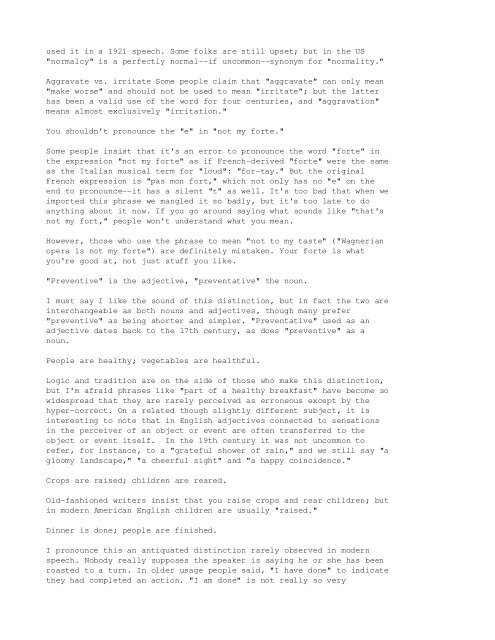Common_Errors_in_English_usage
Common_Errors_in_English_usage
Common_Errors_in_English_usage
You also want an ePaper? Increase the reach of your titles
YUMPU automatically turns print PDFs into web optimized ePapers that Google loves.
used it <strong>in</strong> a 1921 speech. Some folks are still upset; but <strong>in</strong> the US<br />
"normalcy" is a perfectly normalif uncommonsynonym for "normality."<br />
Aggravate vs. irritate Some people claim that "aggravate" can only mean<br />
"make worse" and should not be used to mean "irritate"; but the latter<br />
has been a valid use of the word for four centuries, and "aggravation"<br />
means almost exclusively "irritation."<br />
You shouldn't pronounce the "e" <strong>in</strong> "not my forte."<br />
Some people <strong>in</strong>sist that it's an error to pronounce the word "forte" <strong>in</strong><br />
the expression "not my forte" as if Frenchderived "forte" were the same<br />
as the Italian musical term for "loud": "fortay." But the orig<strong>in</strong>al<br />
French expression is "pas mon fort," which not only has no "e" on the<br />
end to pronounceit has a silent "t" as well. It's too bad that when we<br />
imported this phrase we mangled it so badly, but it's too late to do<br />
anyth<strong>in</strong>g about it now. If you go around say<strong>in</strong>g what sounds like "that's<br />
not my fort," people won't understand what you mean.<br />
However, those who use the phrase to mean "not to my taste" ("Wagnerian<br />
opera is not my forte") are def<strong>in</strong>itely mistaken. Your forte is what<br />
you're good at, not just stuff you like.<br />
"Preventive" is the adjective, "preventative" the noun.<br />
I must say I like the sound of this dist<strong>in</strong>ction, but <strong>in</strong> fact the two are<br />
<strong>in</strong>terchangeable as both nouns and adjectives, though many prefer<br />
"preventive" as be<strong>in</strong>g shorter and simpler. "Preventative" used as an<br />
adjective dates back to the 17th century, as does "preventive" as a<br />
noun.<br />
People are healthy; vegetables are healthful.<br />
Logic and tradition are on the side of those who make this dist<strong>in</strong>ction,<br />
but I'm afraid phrases like "part of a healthy breakfast" have become so<br />
widespread that they are rarely perceived as erroneous except by the<br />
hypercorrect. On a related though slightly different subject, it is<br />
<strong>in</strong>terest<strong>in</strong>g to note that <strong>in</strong> <strong>English</strong> adjectives connected to sensations<br />
<strong>in</strong> the perceiver of an object or event are often transferred to the<br />
object or event itself. In the 19th century it was not uncommon to<br />
refer, for <strong>in</strong>stance, to a "grateful shower of ra<strong>in</strong>," and we still say "a<br />
gloomy landscape," "a cheerful sight" and "a happy co<strong>in</strong>cidence."<br />
Crops are raised; children are reared.<br />
Oldfashioned writers <strong>in</strong>sist that you raise crops and rear children; but<br />
<strong>in</strong> modern American <strong>English</strong> children are usually "raised."<br />
D<strong>in</strong>ner is done; people are f<strong>in</strong>ished.<br />
I pronounce this an antiquated dist<strong>in</strong>ction rarely observed <strong>in</strong> modern<br />
speech. Nobody really supposes the speaker is say<strong>in</strong>g he or she has been<br />
roasted to a turn. In older <strong>usage</strong> people said, "I have done" to <strong>in</strong>dicate<br />
they had completed an action. "I am done" is not really so very





